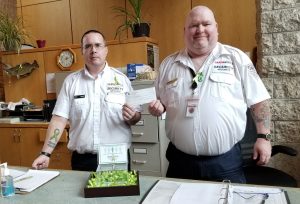Menu
Close
You don’t always have to be strong, it’s OK to ask for help
Jun 12, 2018

Michael Post (left) is a strong advocate for mental health and eliminating the stigma surrounding mental health.
Guest blog post by Michael W. Post, Apsley
Michael Easter, a writer for men’s health states, “As men, we think we can control everything. I now realise that it’s not only OK to be vulnerable, but that embracing your powerlessness is necessary for emotional and spiritual growth. It allows you to quit fighting when you’re beat, and cures you of the notion that your way is the only way.”
This is a quote that had a profound impact on me.
Not very long ago, I wore a disguise. Hiding from my family, friends and coworkers, the disguise that I wore was that of someone who was happy with his life, smiling and laughing on the outside. But inside, the opposite. Sadness, anger, confusion, frustration and feeling empty inside. Once you get used to wearing a disguise, it’s hard to let anybody see the real you. It’s hard to take off the mask when you are also trying to hide from yourself.
Thankfully, there are people who can see through your disguise. They see the real you, and they help us see that in order to move forward you have to remove the mask, even though as men we find it difficult to admit that we are struggling. We feel embarrassed to admit we might have a mental health problem. Even opening up to family and friends is not easy because we feel that talking about our feelings makes us weak.
What we have to realise is…it’s OK to be sad. It’s OK to feel anxious or scared. It’s OK to ask for help. I know from experience that asking for help is a difficult thing to do, especially regarding my mental health. We are scared to ask for help because we are afraid that people will judge us, or label us as crazy. When people, even so called friends, hear that you have mental health issues they tend to shy away from you. Most think you are just seeking attention.
I have heard people say “Depression isn’t real, just shake it off.”
Just because you don’t understand, it doesn’t mean it’s not real. Depression is very real, so is anxiety, PTSD and every other mental health issue people suffer with every day.
Getting the help you need is much more important than other people’s opinions. Find someone who won’t judge you, someone who doesn’t think they need to fix you. Someone willing to listen. Someone who will hold you and tell you it’s OK if you’re not OK.
Saying those three little words, “I need help,” doesn’t make you weak, it means you are incredibly strong.
C.M.H.A. H.K.P.R. would like to thank Michael for his contribution to our blog as well as his dedication to ending the stigma surrounding mental health in our own communities. Earlier this year, Michael launched his own Green Ribbon campaign at his place of employment and on June 24, he is participating in Ride Don’t Hide.